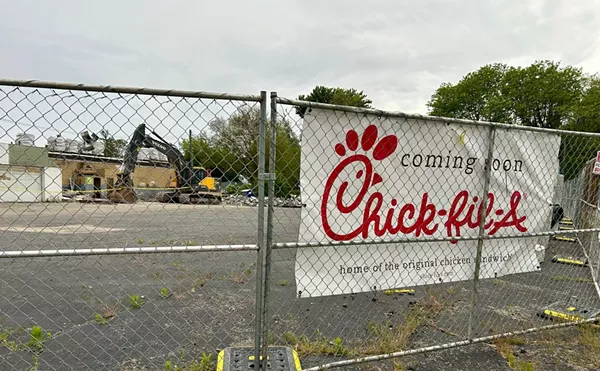Porn and other atrocities
Once upon a time, journalism strived to help people make informed decisions

Audio By Carbonatix
[
{
"name": "GPT - Leaderboard - Inline - Content",
"component": "35519556",
"insertPoint": "5th",
"startingPoint": "3",
"requiredCountToDisplay": "3",
"maxInsertions": 100,
"adList": [
{
"adPreset": "LeaderboardInline"
}
]
}
]
We're all against pornography, even the pornographers.
That's because campaigning against the evils of their trade helps generate free publicity for them. That's at least as true of prostitution, perhaps especially child prostitution.
CNN, which once upon a time actually covered significant news in a serious way, aired a documentary last month called Selling the Girl Next Door, which was billed as an exposé of underage prostitution, which everyone agrees is a bad thing. Everyone, that is, except its few million or so clients, something usually glossed over in our zeal to whack prostitutes and pimps.
I saw perhaps a third of the documentary while engaged in the decidedly non-prurient job of cleaning my basement after a sewer pipe burst and the floor had to be dug up to replace it.
The host was not anyone resembling Edward R. Murrow, but a ravishing blonde (Amber Lyon) who seemed barely legal herself, which may have been the point. She raised our social conscience by telling us that the World Wide Web has become a sexual supermarket. Sex ads had been driven off Craigslist, at least in part, she hinted, because of her crusade against sexploitation.
Instead, however, a new site provides links and ads to underage prostitution in every city. She named it several times, evidently to make sure we wouldn't look it up by accident.
"Well, they'll shut that down by noon tomorrow," I thought, as I stuffed another contaminated throw rug into the washing machine.
Silly me. Having jotted it down, I logged on Tuesday. (Actually, I had it wrong at first, and blundered onto what seemed to be an exclusively anal sex site. Ouch.) Once I got it right, I found that, sure enough, the supermarket was still open. Some of the hookers, indeed, looked like jailbait. But others were clearly mature.
Some were downright scary, in fact, offering whips and chains and "waterfalls." Nor were all of them women. In fact, just about everything was on offer except an ocelot.
Incidentally, if there are any ocelot sex sites I don't want to know about them. The non-ocelot hookers, did, however, all seem to be observing the item-pricing law. I wondered idly how much new business they owed to CNN.
This was, I suppose, more titillating than the fact that the governments of most states, not just Michigan, are on the point of collapse. I did idly wonder how much tax revenue states might realize if they abandoned hypocrisy and licensed and regulated an activity they're never going to stop. Bet nobody's looked into that.
But beyond all this, the wide world of hookers may — perhaps — be just a smidgen less significant than the possible collapse of, say, education funding in our state.
Once upon the time, before the age of hooker cafeterias on the World Wide Web, there was a quaint belief that journalism was supposed to help us make sense of the world. One of the major ways we did that was to sort out what was really important from that which was only fascinatingly loopy. Not only don't we do that anymore; even when we do try to tackle the serious news, we end up being manipulated by politicians of all stripes. Take, for example, the "Citizen's Guide to Michigan's Financial Health," which the governor delivered Jan. 31.
This is a mostly sound and well-written booklet that does a pretty good job explaining to the average person how we got in the mess we are in. But almost everyone ignored all but one small section of the report that went out of its way to bash government workers.
"Average annual compensation of state employees (including salary, wages and benefits) was over twice the average annual compensation of private sector workers in 2009," screamed a sentence that had been put in a box to draw attention to it.
Not only that, but it also said, in bold type, "Compensation of state and local government employees has increased during the last 10 years while private sector compensation has declined in real, inflation-adjusted terms."
In other words: Let's string up those greedy kindergarten teachers and desk clerks at Clawson city hall. That'll save our state!
That set off a firestorm. Conservatives said they knew it all along. Public employee unions cried outrage, and within days were out with a study done by the (union-friendly) Economic Policy Institute, that claimed they were underpaid.
So who was right? Both, actually. The sections highlighted in the government study seemed designed to give a misleading impression. The problem was the study compared a largely highly educated and skilled state work force to an undereducated private sector one. When specific jobs are compared, to the extent they can be, state and local employees make a little less, but have slightly better benefits.
The study itself — and the governor — admitted they weren't comparing "private and public sector employees with similar jobs, years of experience or education." It also notes that "compensation for public schools teachers has fallen," since 2000.
Not to mention that there has also been a vast decline in the number of both local and state employees in recent years.
Ho hum. But what was criminal about this silliness is this: It took our attention off the real problems we are facing.
They are beyond huge. Consider: The day the governor's report was released, the Senate Fiscal Agency released a report revealing that the state's public retirement systems have combined unfunded liabilities of $15.4 billion. Ten years ago, they were in fine shape.
Also that same day, Treasurer Andy Dillon, the former speaker of the House, had a press conference urging the Legislature to pass a new law making it easier for the state to take control when cities are near financial collapse. Five communities are in such sad shape they may soon be unable to pay their employees.
That number will likely grow. For years, we've been demanding less taxes and more services. As a result, as the governor's report says, "many governments in Michigan are spending more than they are taking in. To support their spending, they have drained their savings, borrowed money, and failed to put money away for liabilities."
This is a problem that's been building for many years, of course. But our leaders and our media never bothered to tell you about it.
Pretty soon, one way or another, we'll be living with the consequences. But meanwhile — aren't those Kardashian girls great!
Violence porn: But back to pornography — there's a new and disturbing trend in the business that has nothing to do with sex: Violence porn. You can go to any local newspaper website and watch the police video of lowlife Lamar Moore shooting up a Detroit police station, wounding four officers before he is fatally shot to death. Other than to provide a primer for how to shoot up a police station, is there any reason to put this on the Internet?
Of course not, except that a lot of people get their jollies by watching violence. Newspapers regularly do this sort of thing now.
I fully expect we'll soon be able to watch Gabrielle Giffords getting drilled though the head, at least once the trial starts. Yes, this is tasteless. But in the words journalists like to use as a substitute for intelligent thought, we can always say it's the public's right to know.





